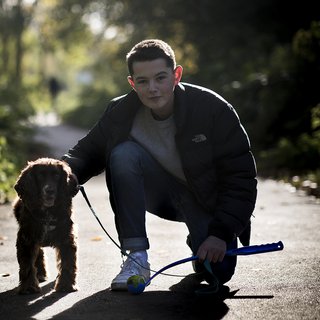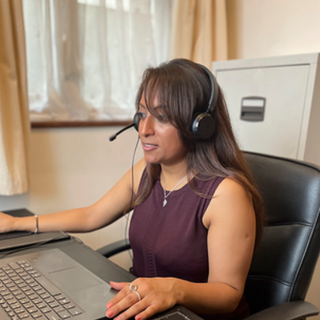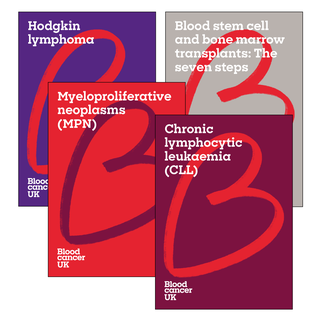Study, university and work
Being told you have blood cancer can seem like a big obstacle in the way of your education or career. It helps to know what your rights are and where you can get support.
Hiral talks about studying after her treatment for leukaemia
Find out why Emily decided to tell her employer about her cancer history
Blood cancer and your rights
The law says cancer is a disability. So you must be treated fairly at work and in education. That’s true whatever stage you’re at, including in remission.
You don't have to tell anyone at work, college or university about your medical history. But if you do, they may have to make “reasonable adjustments” to help you do your job or learn.
Blood cancer and your rights as a college or university student
As a student with blood cancer, you should have the same chance of doing well on your course as anyone else.
Your college or university may have a disability service that can help keep your learning on track. You might be able to find their details on the college or university website, or you can always ask a tutor.
You may be given a disability adviser who’ll ask you what makes studying difficult for you and what would help. The disability adviser will also ask you for evidence of your condition – they’ll tell you what you need to provide.
Get in touch with us as early as possible to make the most of the advice and support we can give.
- Lucy Robinson, Disability Adviser at University of the Arts London
Disabled Students' Allowance
If you’re studying for a bachelors (BA or BSc) or post-grad degree at university, you may be eligible to apply for Disabled Students’ Allowance (DSA). This could give you money for any extra support or equipment you need if blood cancer has affected your ability to study. Your university’s disability service can help you apply.
After talking through your needs with you, a disability adviser can write something called a support agreement to share with your tutors. This will explain what help you need but may not say what your condition is if you don’t want it to. You can tell your tutors about your experience with blood cancer if you feel comfortable about it.
Your initial plan of action when you know where you’re going to study is:
- Contact your university’s disability service.
- Give them written evidence of your condition.
- Apply for funding from Disabled Students' Allowance if you’re eligible.
– Lucy Robinson, Disability Adviser at University of the Arts London
Reasonable adjustments
As a student with blood cancer, you might have more difficulties than other people because of the effects of the cancer or your treatment. For example, you might have fatigue (extreme tiredness), memory or concentration problems, or simply need to go to lots of medical appointments.
To help with these things, you have the right to ask for “reasonable adjustments”.
Reasonable adjustments are changes to the environment or teaching which help you to access learning on an equal footing, such as extra time for exams, speech-to-text software or a note-taker. What you need will be individual to you.
- Lucy Robinson, Disability Adviser at University of the Arts London
Other examples of adjustments, depending on your personal situation, might be:
- more time for assignments if you have fatigue or other side effects
- timetable planning to help with fatigue or to avoid crowded places
- permission to record lectures and classes
- more flexibility about your attendance to allow for medical appointments
- catch-up sessions if you miss lectures
- using of a room on campus if you need rest breaks
- support from staff if you need to take time out from your studies
- a parking space on campus.
As the coronavirus pandemic continues and face-to-face teaching is limited, reasonable adjustments are more likely to focus on accessing online learning. Speak to your student disability service about what this means for you.
Student Space has advice on online learning and lots of other resources to support students through the pandemic.
Real stories from Blood Cancer UK and Teenage Cancer Trust
Read Jamie's story: University after shielding – a student’s view
And here's Nicole's story: I was anxious about shielding ending and going back to uni during the pandemic
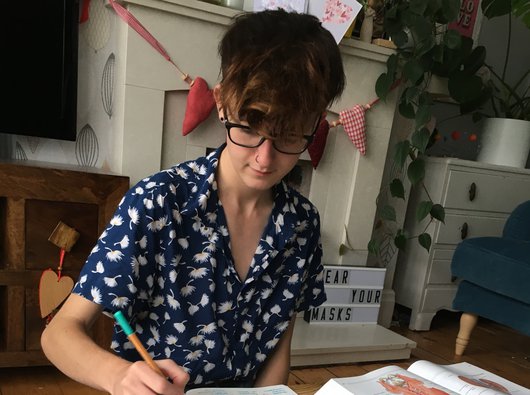
If you’re at school
If you’re diagnosed with blood cancer while you’re at school, it can be really helpful to talk to your school about how they can support you with your studies.
Think about how you feel physically and mentally and get advice from your healthcare team about how your treatment might affect you in the future. Your next step could then be to talk to someone at school about what you need to help you carry on studying – perhaps your form teacher or head of year first.
For example, you might need to start school later or finish earlier to cope with feeling really tired when you’re on treatment. You might want support to study at home some of the time. You could also ask if it’s possible to attend some classes virtually.
While you’re in hospital
If you need to spend an extended period of time in hospital for treatment, talk to your nurses, social worker or youth worker about getting help to carry on with your school work and exams.
Some hospitals that specialise in treating children and young adults have hospital schools which have teachers on site to help you. They can work with your regular school to help you keep up while you’re in hospital.
Find out more
- Teenage Cancer Trust has study stories shared by school students with cancer.
- Well at School has information about support for students with cancer.
- CLIC Sargent has information for schools on supporting students with cancer.
Blood cancer and your rights at work
You may not feel like someone with a disability, but cancer being defined this way in law means you’re protected against discrimination, whether you’re in a job or applying for one.
At any time, you can ask your employer for reasonable adjustments – changes to the workplace or the way you work that will help you do your job. As things can change, it’s a good idea to review these adjustments regularly with your managers.
What you agree with your workplace will depend on you and your individual needs, but here are some examples of common adjustments:
- taking time off for medical appointments or counselling
- cutting your working hours
- working flexibly or job-sharing
- changing your work routine to suit the times when you feel at your best
- taking more breaks
- limiting work that’s physically demanding or likely to make you tired
- getting a parking space close to work.
Have a think about what you might find difficult about your job and what would make things easier. Employers might find it helpful if you offer possible solutions to any problems you might face.
Find out how four young adults got their lives back on track:
If you’ve got a job and you’re clinically extremely vulnerable (you got a shielding letter), you should work from home if you can. Nobody with blood cancer should be going to work if their workplace isn't COVID-safe.
If you can’t work from home, you can ask your employer if you can go on full or part-time furlough. Furlough is a government scheme where you get 80% of your usual pay for any hours you don’t work. It will run till the end of April 2021. If furlough isn't possible, you may qualify for Statutory Sick Pay (SSP), your company's sick pay policy, or other benefits.
Find out more
Read our information on working during the pandemic, talking to your employer and claiming benefits on our Money and work page.
Real stories from Blood Cancer UK and Teenage Cancer Trust
Nabeela tells her story: Blood cancer, coronavirus and starting my career
Read Claire's story: With the pandemic, nothing is normal – celebrating the all clear took a back seat
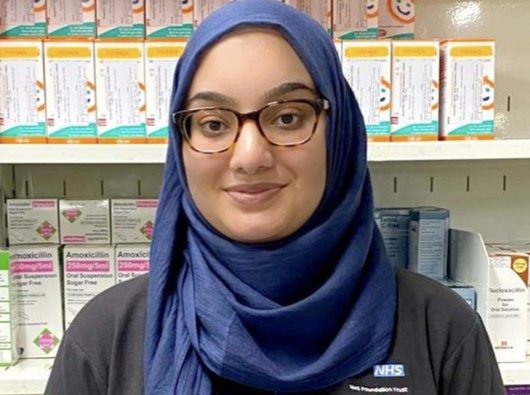
Looking for a job
It’s a difficult time to look for a job, but online information from the government and youth charities might be a good place to start:
- The jobhelp website has information and advice for under 25s, including details of the new Kickstart scheme, set up to fund job placements in UK companies for 16- to 24-year-olds on Universal Credit.
- The Mix has information on job hunting, zero hours contracts, surviving unemployment and more.
- The National Careers Service has information and a support line to help you make decisions about training and work. There’s a specific section on career and job support for people with a disability. (That includes cancer.)
Benefits
If you’re not working or you are but you’re on a low income, you may be able to claim certain benefits:
Ask your GP, keyworker, youth support worker or social worker about which benefits you’re eligible for and how to apply. You can also call Citizens Advice on 0344 411 1444 or Macmillan Cancer Support on 0808 808 00 00.
Go to our Money and work page for more information on claiming benefits if you’re not working or you’re on a low income.

Help others by sharing your story
Having blood cancer can feel very lonely. People say that it helps to hear from others in a similar situation - how they feel and how they're getting through it. You can help by sharing your story, when you're ready.
Our videos
The video on this page was shot before the coronavirus pandemic. Some activities described might not be possible at the moment. See our guidance on staying safe.

